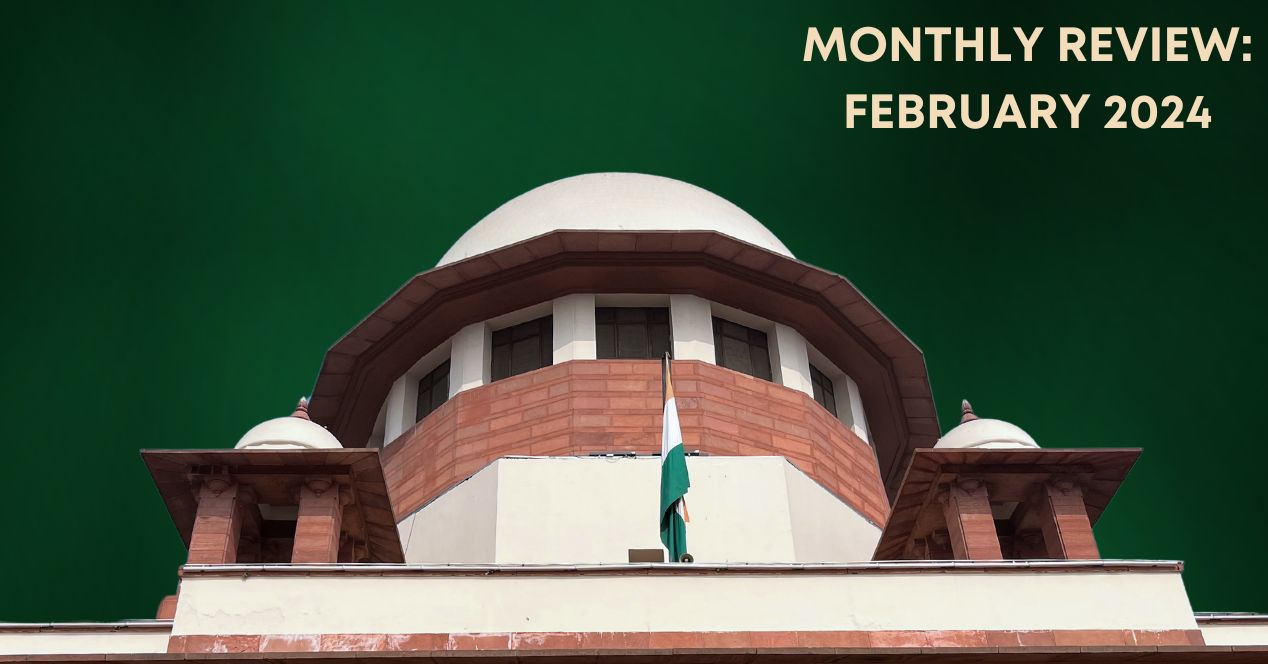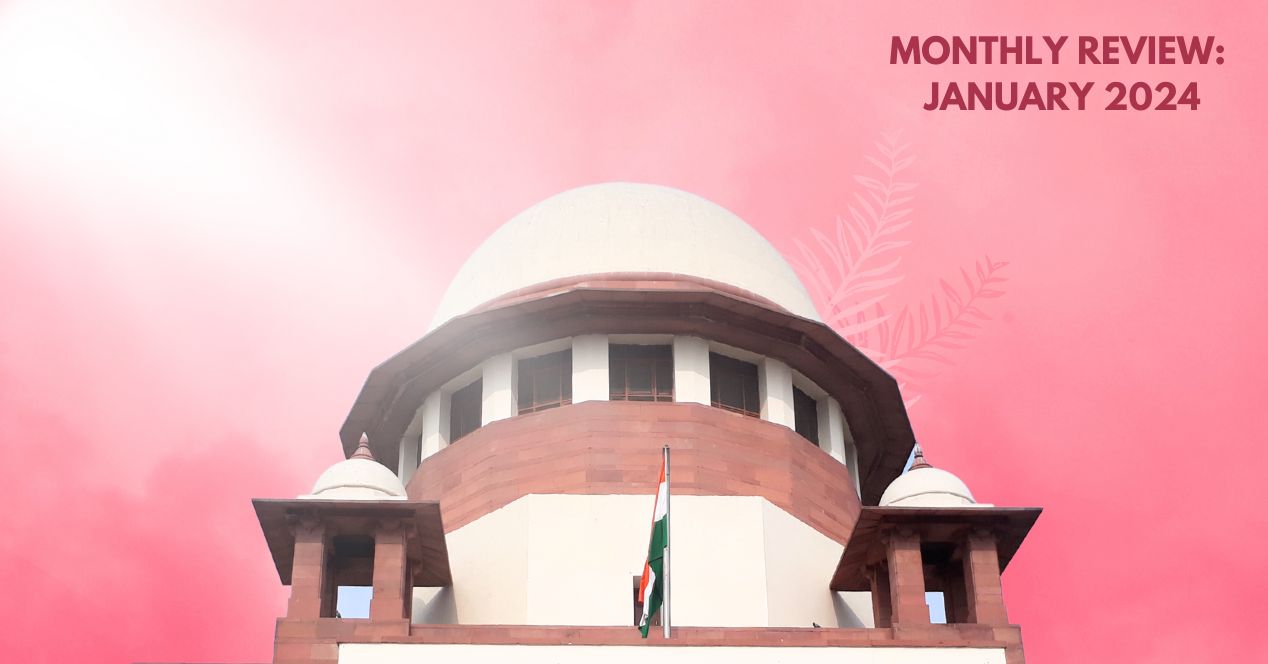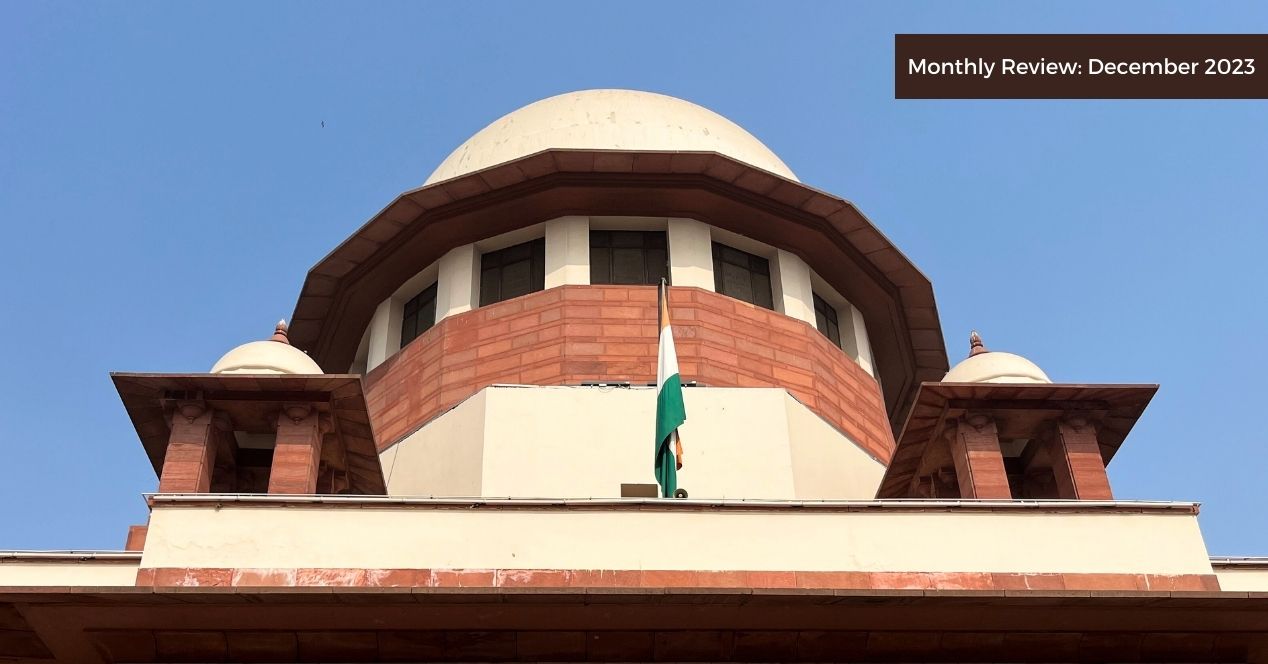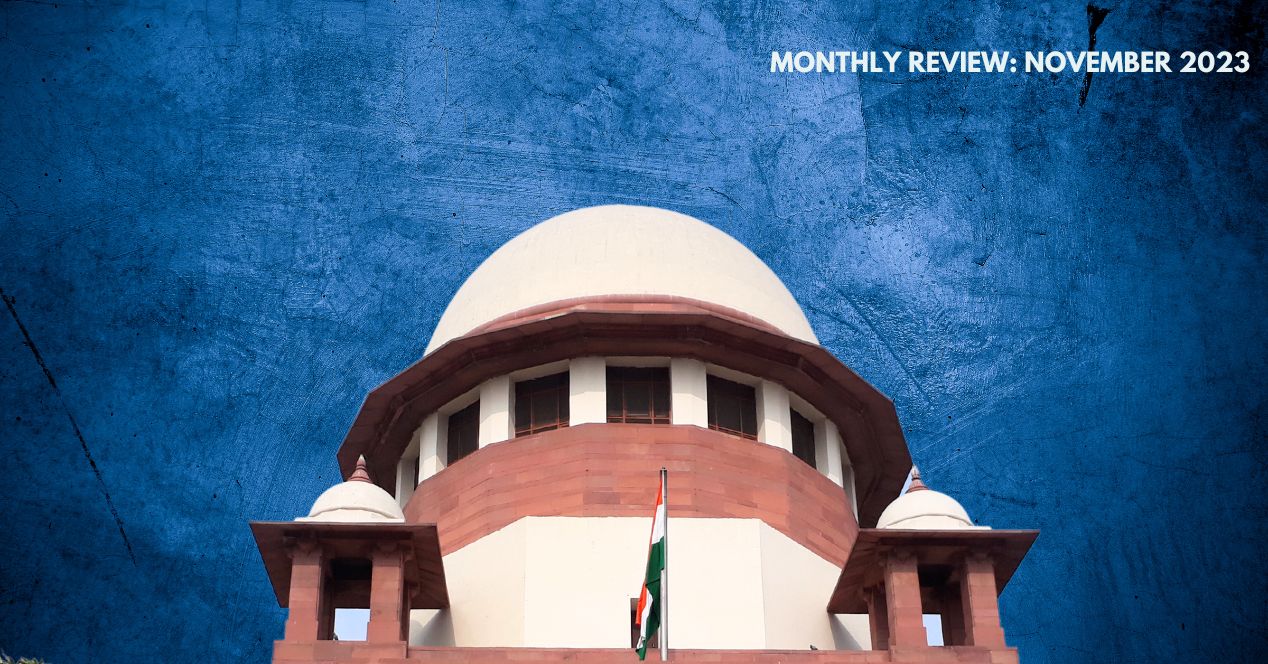Analysis
Monthly Review: March 2024
In March 2024, Division Benches of the top court passed crucial orders which impact governance, elections and free speech
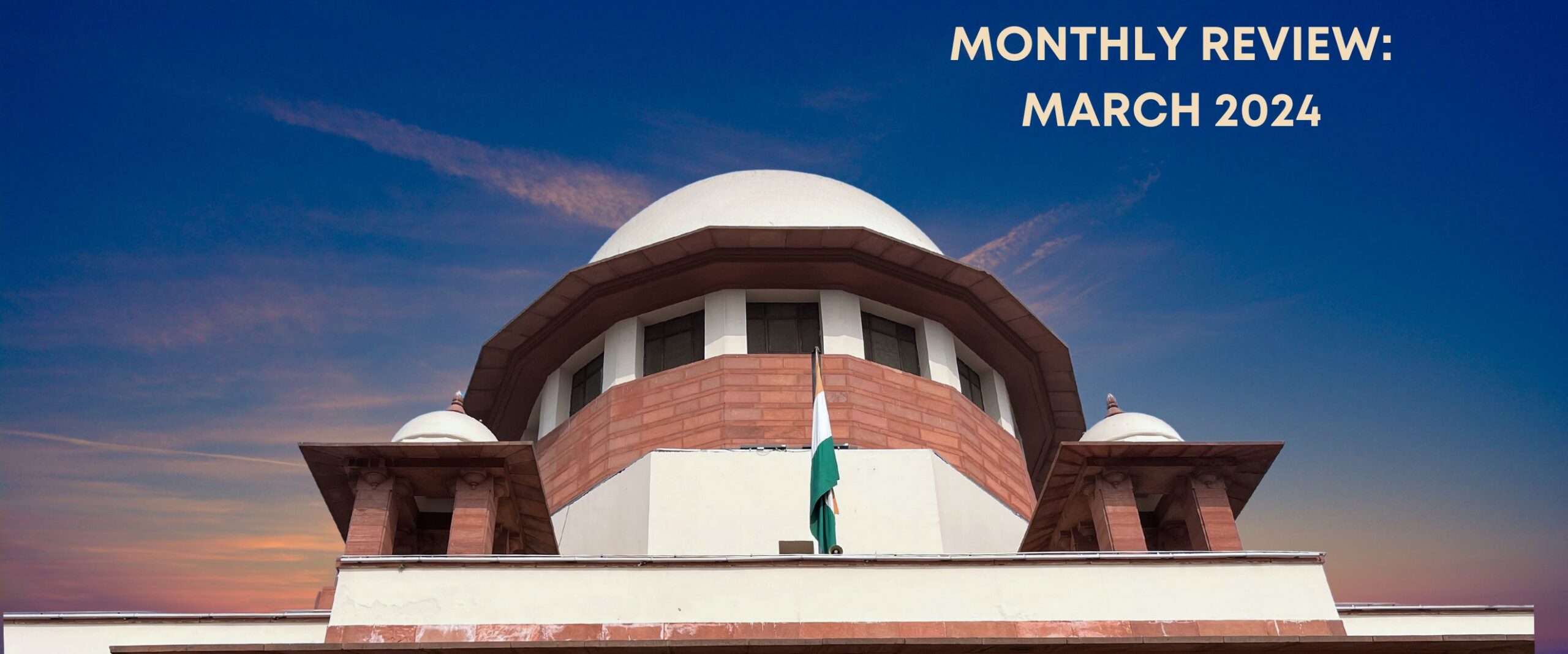
In March 2024, the Supreme Court was on a week-long break for Holi. During, the other three weeks of the month, the Court dealt with several crucial cases on its docket.
Constitution Bench activity continued with encouraging momentum. Nine-judges deliberated upon who had control over taxing mines and minerals—the Union or the state governments. A seven-judge bench declared that bribes accepted by lawmakers are not protected by immunity and a five-judge bench in the Electoral Bonds case issued contempt warnings against the State Bank of India (SBI).
Division Benches also made headlines. A bench led by Chief Justice D.Y. Chandrachud refused to stay the 2024 Rules under the Citizenship Amendment Act. Another bench led by Justice Sanjiv Khanna refused to stay the Election Commissioners Appointments Act before the upcoming general elections.
This past month, Division Benches of the Court also stayed a Union established fact-check unit and reprimanded the Tamil Nadu Governor for stalling the reinstatement of a disqualified minister.
No reward for bad behaviour
On 4 March 2024, a seven-judge Constitution Bench unanimously held that lawmakers are not protected with immunity under Article 105(2) and Article 194(2) of the Constitution, when they accept bribes to perform their duties.
The Bench overruled a five-judge Bench decision in P. V. Narasimha Rao v State (1998) which held that the immunity granted to lawmakers extended to everything said or any vote cast in the House, even if they were influenced by a bribe.
They found that Narasimha Rao led to a “paradoxical outcome” as it created an “artificial distinction” between those who receive the bribe and perform their end of the bargain and those who receive the same bribe but do not carry out the agreed task.
All means all!
On 18 March 2024, a five-judge Constitution Bench came down heavily on the State Bank of India for not complying with its judgement in the Electoral Bonds case. This was SBI’s third visit at the Supreme Court after the Bench struck down the Union’s 2018 Electoral Bond Scheme for violating the voters right to information.The Court ordered a complete disclosure of transaction details of Electoral Bonds from the SBI.
Per the Courts’ judgement delivered on 15 February 2024, SBI was supposed to disclose all information to the Election Commission of India by 6 March 2024. Two days before the deadline, SBI came to court requesting time till 30 June 2024.
The Bench dismissed their request, gave them 24 hours to comply and warned them of contempt proceedings. On 15 March, the Court noted that the SBI excluded the alphanumeric details which could help in identifying the purchaser of the bond and its beneficiary. In its last warning on 18 March, the Court stated that the directions of disclosure were issued based “on the idea that SBI would be candid and fair to the Court.”
Who is the Taxman?
On 14 March 2024, a nine-judge bench reserved judgement in a case determining a state government’s power to tax mines and minerals. Over eight days of hearings, state governments argued that taxing of mines and minerals were included in the State List, giving them the exclusive power to tax.
The Union contended that the Mines and Minerals (Development and Regulation) Act, 1957 took away the states’ power to tax these minerals.
AAP ka Makaan
On 4 March 2024, the Supreme Court directed the Aam Aadmi Party to vacate a bungalow on the Rouse Avenue Complex by 15 June 2024. AAP of encroaching the area that was allotted to the Delhi High Court for an expansion project. Senior Advocate Abhishek Manu Singhvi, appearing for AAP, stated that the Union refused to provide an alternate location in Central Delhi for AAP for political reasons. The Court directed the Land and Development Office to consider AAP’s application for alternate premises in four weeks.
Old game, new rules
On 11 March 2024, in the same week as the 2024 elections were announced, the Union notified the Citizenship (Amendment) Rules 2024. The rules came four years after the Citizenship (Amendment) Act 2019 was passed by the Union.
On 19 March, over 230 petitions challenging the Act moved the top court again. The new rules, they said, must be stayed as they fast tracked the process of granting citizenship to non-muslims in from Afghanistan, Bangladesh, and Pakistan. The Supreme Court refused to issue an immediate stay on the Rules and the Act and directed the Union to file their response.
The Court is expected to hear the cse again on 9 April 2024.
New law, new elections, new commissioners
On 21 March 2024, the Supreme Court refused to stay the Chief Election Commissioner and Other Election Commissioner Act, 2023. The Court reasoned that it was against the “balance of convenience” to stay the Act before the upcoming elections.
The petitioners have argued that the Act goes against the spirit of Anoop Baranwal v Union of India (2023). In this case, a five-judge Constitution Bench of the Court recommended a three-member committee comprising the Prime Minister, the Leader of the Opposition and the Chief Justice of India to nominate members to the Election Commission.
The challenged Act replaces the CJI with another member appointed by the Union.
A check on the fact-check
On 21 March 2024, the Supreme Court stayed the Union government’s notification that established a fact check unit under Rule 3(1)(b)(v) of the Information Technology (Intermediary Guidelines and Digital Media Ethics Code) Amendment Rules, 2023. The Rules direct social media intermediaries to remove any news related to the “business of the Central Government” that is deemed “fake, false, or misleading” by a fact-checking unit established by the Union.The next day, a Division Bench of the Supreme Court transferred more than a dozen petitions challenging the Information Technology (Intermediary Guidelines and Digital Media Ethics Code) Rules, 2021 (IT Rules 2021) to the Delhi High Court.
The IT Rules 2021 were a fresh set of guidelines issued to ensure accountability of social media and digital news platforms.
Governing the Governor
On 21 March 2024, a bench led by CJI Chandrachud warned the Governor of Tamil Nadu R.N. Ravi for failing to reinduct ex-minister K. Ponmudy.
Ponmudy was disqualified from his ministry as the Madras High Court had convicted him for allegedly amassing disproportionate assets with his wife. However on 11 March 2024, Justices A.S. Oka and Ujjal Bhuyan stayed the conviction.
But R.N. Ravi, Governor of Tamil Nadu refused to re-induct Ponmudy on the ground that the Supreme Court had “only suspended, not set aside” his conviction. The top court sternly warned the Governor for defying its order. “When the Supreme Court of India stays a conviction, the law has to be followed,” exclaimed CJI Chandrachud.
On 22 March 2024, Attorney General R. Venkataramani informed the bench that the Governor would reinduct Ponmudy to swear in as a minister.
Wait time for freedom: 10 years
On 7 March 2024, the Bombay High Court acquitted Prof G.N. Saibaba of charges under the Unlawful Activities Prevention Act, 1967. He was released from prison after 10 years of incarceration. The Bombay High Court, while acquitting Saibaba, stated that there was no material evidence to establish a “preparatory act,” besides accusations of waging war against the Government. A Division Bench of the Supreme Court refused to stay the acquittal by calling it a well reasoned judgement.
In an exclusive interview with the Supreme Court Observer, Saibaba he talked about how the failures of the judiciary is reflected in prisons. Criminal lawyer Harsh Bora who represented Saibaba in the Bombay High Court wrote about the evidence gaps in the case.
We also looked into the impact of the trial and what it means for justice in our feature and analysed where the law and courts stood on the question of compensation for unfair trials.
Too much information
In March 2024, we at the Supreme Court Observer filed an RTI for a list of the longest pending cases in the Supreme Court. We received a list of 24 cases that were pending for over 30 years. We published a detailed story on each of these cases.
Adieu: Senior Advocate Fali S. Nariman passed away on 21 February 2024, at the age of 95. Here is an excerpt from his autobiography, Before Memory Fades.
Judges and tenures
We dug into the tenures of the sitting judges at the Supreme Court and found that half of them will serve a tenure less than 5.3 years. By virtue of being the seniormost, Chief Justice D.Y. Chandrachud, is the longest serving judge among the current cohort..
Justice B.V. Nagarathna is the only woman judge to surpass the average tenure. She is expected to serve 6.2 years, including 36 days as India’s first woman Chief Justice. The other women judges, Justice Bela Trivedi and Justice Hima Kohli will serve 3.8 years and 3 years respectively. Read about the tenures of other sitting judges here.

